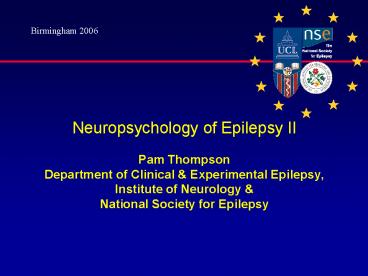Neuropsychology of Epilepsy II PowerPoint PPT Presentation
1 / 25
Title: Neuropsychology of Epilepsy II
1
Birmingham 2006
- Neuropsychology of Epilepsy II
- Pam Thompson
- Department of Clinical Experimental Epilepsy,
- Institute of Neurology
- National Society for Epilepsy
2
Surgical treatment
- temporal lobe surgery
- most common most successful
- NHNN experience
- 1988 programme began
- neuropsychological assessment part of
pre-surgical work-up - MRI, EEG, Psychiatry
- 31/12/2005 N 360 cases
3
Surgical treatment
- Why assess?
- prognostic data
- good concordance between investigations good
prognosis for seizure control - provides data to counsel patients
- flags up cases at risk of major cognitive
decline
4
Surgical treatment
- Historical background
- 1940s 1950s bilateral temporal lobectomies
- 40 published cases
- Scoville no marked changes with the exception
of a very grave,recent memory loss so severe as
to prevent our patient (HM) from remembering the
names of his close associates or even the way to
the toilet - 48 years amnesic
5
Surgical treatment
- Historical background
- unilateral temporal lobectomy cases
- NT RTL epileptogenic focus on EEG
- 1961 RTLR
- Surgical specimen normal
- Profoundly amnesic
- 1986 diedpost-mortem LHS
6
Surgical treatment
- Neuropsychological assessment
- detailed assessmentemphasis on memory
- subjective ratings of everyday problems
- FU 3-6 ms 1-2 yrs
- existing FU data regularly analysed
- used in pre-op counselling
- sodium amytal procedure (WADA)
- routinely 1988-1995
- selectively 1995-2004
- rarely 2005 -
7
Temporal lobe surgery
8
cases showing change in verbal learning score _at_
one year.
9
Predicting decline
- Significant
- left sided
- good verbal memory
- age gt 40yrs
- additional pathology
- Not significant
- Age of onset epilepsy
- duration
- Verbal IQ
Seizure control?
10
N cases showing decline in verbal learning score
11
Intracarotid Sodium Amytal Test
- Gardner 1941
- temporary inactivation of language zone
- procaine hydrochloride via trephine hole
- 1949 Wada sodium amobarbital
- 1960 first series published N20
- direct into common carotid
- 1962 for memory assessment
12
Intracarotid Sodium Amytal Test
- 1. To establish language dominance
- 95 RH left dominant
- 80 genetic LH left dominant
- rates of atypical dominance elevated in PWE
- LH 69 left 18 right 13 both
- Why important
- decision to operate
- size of resection
- type of operation
- 2. To screen for amnesia
13
Intra-carotid Sodium Amytal Test
- ipsilateral
contralateral
14
Procedure
- 2-3 pictures
- Injection incremental until hemi-paresis
- Present 8 objects for naming
- Test memory for 4 objects
- Test memory pre-injection items
- Upon recovery test for remaining 4 objects
15
Procedure
- both sides in turn
- ipsilateral side first
- EEG monitored throughout
- video monitoring
- dosage 45mg-625mg
- mode 100mg
- duration 1.5-14 mins
16
Procedure
- 1988-1995
- all cases
- 1995-2004
- selected cases
- discordant data
17
Problems
- invasive, 1 in 200 morbidity
- psychologically stressful
- labour intensive (min n 7)
- costlywagesstay in hospital
- procedural failures
- X flow FLs visual neglectsedation
- testing window small
18
Sodium amytalFailures
- SH
- lhs
- verbal memory impaired visual intact
- amytal not indicated but failed at another centre
- amytal 8/2002 failed
- super selective passed 11/2002
- LTLBR may 2003
- post-op 2/12 sz free 1/m for 5/12 sz free 2004
- not amnesic
- Verbal memory decline (as predicted)
19
Sodium amytalFailure
- PM
- rhs
- visual memory ? verbal memory intact
- failed amytal at another centre
- RTLBx 004/05
- sz free not amnesic
- 6/12 memory no change from pre-op
20
Sodium amytalPass
- AS 54 yrs AO 24 yrs
- EEG RT focus
- amytal at another centre- pass
- 1993 RTLBR post-operative cognitive decline
odd behaviours - Seizure control deteriorated
- Post-op MRI LHS
- Highly dependent after 10yrs wife unable to cope
- Moved to residential care for EMI
21
Sodium amytal test
- not valid as screen for amnesia
- no cases have become amnesic without abnormal
- imaging
22
Sodium amytal test
- not valid as screen for amnesia
- no cases have become amnesic without abnormal
- imaging
- in cases with clear unilateral pathology IAP is
a screening test for a patient that does not
exist - patients with bilateral pathology are _at_ risk
- regardless of amytal outcome?
23
fMRI as alternative
- enables observation of brain activity during
cognition - non-invasive
- less labour intensive
- cheaper (if you have access to a scanner!)
- regard
- good evidence for language lateralisation
- Some evidence for memory
- Any better at predicting meaningful change than
predictions from other existing data
24
Intracarotid Sodium Amytal Test
- 1. language lateralisation
- 2. screen for amnesia
- 3. prediction of memory decline
- 4. lateralisation of seizure focus
- 5. prediction of seizure control
25
Intracarotid Sodium Amytal Test
- 3. prediction of memory decline
- baseline neuropsychological data ,demographic
scan data - amytal data does not improve the accuracy of our
model - other centres show statistical but not clinical
significance - insufficient evidence of continued use of
invasive, costly and psychologically stressful
technique

